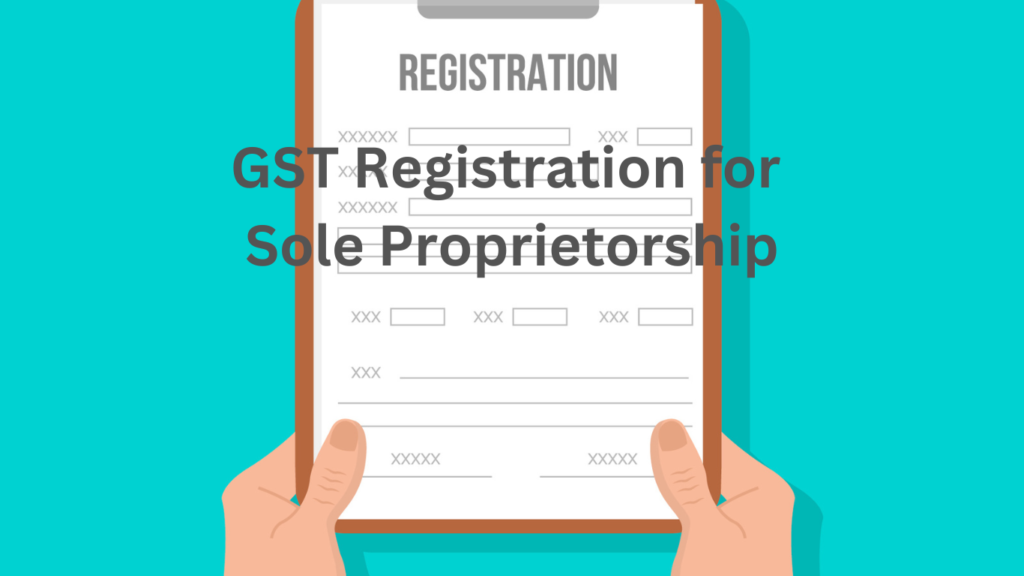If you’re considering starting a sole proprietorship in India, this guide is tailored to provide all the necessary details to Sole Proprietorship Firm Registration and maintaining a proprietorship firm. Here, we’ll cover the registration process, essential documents, compliance requirements, setup costs, and more. Let’s dive in to understand every step of setting up a sole proprietorship firm.

Understanding Sole Proprietorship in India :
A sole proprietorship is one of the simplest and most common business structures, especially for individuals looking to test their business ideas with minimal setup costs and compliance requirements. Unlike a private limited company or LLP, a sole proprietorship doesn’t require a registration certificate or standard licensing. However, certain licenses are required based on the type of business.
Steps for Sole Proprietorship Registration in India:
Since there’s no central registration process, setting up a sole proprietorship involves two main steps:
Obtaining Necessary Licenses: The licenses required depend on the nature of your business. For instance, you might need an MSME (Udyam) certificate, GST registration, or a shop and establishment license.
Opening a Current Account: After acquiring the relevant licenses, visit a bank to open a current account in your business name.
Important Note:
According to RBI guidelines, you typically need at least two business licenses to open a current account. Let’s discuss the types of licenses that are applicable and how to obtain them.
Read This Also: Partnership Firm Registration Guide
Essential Licenses for Sole Proprietorship :
1. MSME (Udyam) Registration:
Purpose: This certificate is highly recommended for small businesses as it establishes a formal identity.
Process: Apply online at the Udyam Registration website using your Aadhaar linked with a mobile number. This is a self-declaration-based certificate, so no document uploads are required.
Cost: Free of government charges, and you get instant approval.
2. GST Registration:
Applicability: If your business turnover exceeds Rs. 40 lakhs for goods or Rs. 20 lakhs for services, GST registration is mandatory.
Process: The application is filed online, followed by biometric verification. You can use this GST certificate as one of the licenses for opening a current account. check here GST registration process
3. Shop & Establishment License or Gumasta License:
Purpose: Many states require a shop and establishment license, known as the Gumasta license in some regions like Maharashtra, for all types of businesses.
Process: This varies by state, with some having an online process and others requiring an offline application at the local municipal office.
4. Other Licenses and Certificates:
Professional Tax Registration: Required in many states.
IEC Code for Import-Export: Essential if you’re in import-export.
Trademark Registration: Not mandatory, but recommended to protect your business name.
5. CA Certification:
Purpose: A Chartered Accountant’s certificate on their letterhead can be used for opening a current account.
Documents Required for Sole Proprietorship Registration :
For any of the licenses or certificates mentioned, here’s a list of common documents required:
Identity Proof: Aadhaar and PAN card.
Address Proof of Business: Electricity bill, property tax receipt, or rent agreement with an NOC from the property owner.
Business Name: Choose a name for your business.
Compliance Requirements for a Sole Proprietorship :
Once your sole proprietorship is set up, some compliance requirements need to be followed:
1. Income Tax Return (ITR): Annually file your income tax returns as a sole proprietor, reporting business income, profit, or loss.
2. GST Compliance (if registered): Monthly or quarterly GST returns must be filed. This compliance is mandatory if you have a GST certificate.
3. Professional Tax Compliance: If applicable in your state, professional tax payments and filings are required periodically.
Estimated Cost of Setting Up a Sole Proprietorship :
Costs associated with a sole proprietorship are typically lower than other business structures, as government fees are generally minimal or even nil in some cases. However, you might incur:
Government Fees: Usually nominal or zero for MSME or Udyam registration; applicable charges for other licenses vary by state.
Professional Fees: If hiring a consultant or CA, you may need to budget between INR 1,000 to INR 5,000.
Advantages of a Sole Proprietorship :
Requires minimal documentation and low compliance costs.
Being the sole owner, you retain complete decision-making power.
Limitations of a Sole Proprietorship :
Anyone can use a similar name unless you have a trademark.
In case of business losses, the owner’s assets are at risk.
Difficult to raise venture capital or external investment.
Starting a sole proprietorship is an ideal choice for small business ventures with minimal investment and compliance requirements. However, as the business grows, transitioning to a private limited company or LLP can offer more benefits in terms of brand protection, liability, and funding.
By understanding the registration process and compliance requirements, you can confidently start and manage a sole proprietorship firm in India. If you need further assistance, consult a professional, and explore the dedicated resources available online for each registration process.
FAQs: Sole Proprietorship Firm Registration in India
1. What is a sole proprietorship?
A simple business structure owned and managed by one individual with minimal setup and compliance requirements.
2. Is registration required?
No central registration is needed, but licenses like MSME (Udyam), GST, or Shop & Establishment may be required.
3. How do I set up a sole proprietorship?
- Get necessary licenses (e.g., MSME, GST).
- Open a current account with at least two business licenses.
4. What licenses are commonly needed?
- MSME (Udyam): For small business identity (free).
- GST Registration: Mandatory for higher turnovers.
- Shop & Establishment License: State-specific.
- Optional: Professional Tax, Import-Export Code (IEC), Trademark.
5. What documents are required?
- Identity proof (Aadhaar, PAN).
- Business address proof (electricity bill, rent agreement).
6. What compliance is required?
- File annual Income Tax Returns.
- GST returns (if registered).
- Professional tax filings (if applicable).
7. What are the costs?
- Minimal government fees.
- Professional fees: INR 1,000–5,000 for assistance.
10. When to switch structures?
Consider transitioning to a private limited company or LLP as your business grows for liability protection and funding opportunities.


